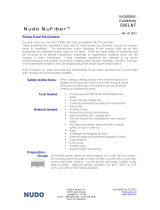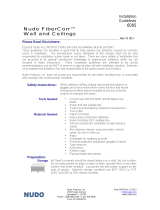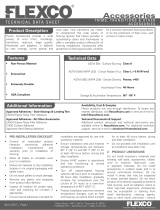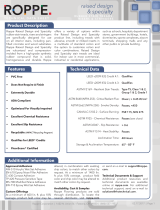Page is loading ...

700 Series Wall Base
Installation
Page 1 of 2 | © Roppe Corporation, Printed in the U.S.A. | January 9, 2013
Read all literature concerning the product description, product limitations, wall surface inspection,
adhesive information, adhesive application, product installation procedures and warranty before
installation. Deliver all materials to the installation location in its original packaging with labels intact. The
installation area, materials and adhesive are to be maintained between 65ºF (19ºC) and 85ºF (30ºC) for
at least 48 hours before installation, during installation, and thereafter. Proceed with the installation only
when the conditions are proper and correct. Inspect all material for proper type and color.
Adhesive for Porous Substrates
Use 1100 Wall Base Adhesive for the installation of 700 Series Wall Base, pre-molded factory corners or
inside & outside rubber corner or micro-corner blocks on porous substrates.
Adhesive for Non-Porous Substrates
Use a premium contact adhesive for the application of 700 Series Wall Base, pre-molded factory corners
or inside & outside rubber corner or micro-corner blocks on non-porous substrates. This includes any and
all vinyl wall coverings, metal, FRP panels, laminates, ceramic tile, marble and/or non-porous paints.
A bond test should be performed at least 72 hours prior to the scheduled installation to ensure the surface
is suitable. There should be difficulty in removing the wall base from the surface but not all situations will
result in tearing of paper from gypsum wallboard surfaces. If the back of the wall base becomes soiled
prior to installation, clean with a soft cloth dampened with a mild soap and water solution, rinse, let dry.
Wall Surface Inspection
All surfaces should be inspected prior to installation. Use only on structurally sound interior wall surfaces
such as dry plaster, cured drywall, exterior grade plywood (Group 1, CC type), concrete, and masonry
that are clean, smooth, dry, and structurally sound. All surfaces must be completely free from moisture,
alkali, old adhesive, dust dirt, wax, oil, grease, loose paint, or plaster, non-porous wall coverings or paints,
and other extraneous coatings or materials that could prevent a successful bond. Plaster and cement
must be thoroughly dry and cured. Any rough or uneven surfaces may telegraph through the wall base.
Follow the manufacturer’s recommendations for any patching materials. Warning: When removing old
wall base or adhesives, unless they can be positively identified not to contain hazardous materials, you
must presume the materials may contain hazardous materials. Follow the recommended practices for the
proper removal and disposal of the materials.
Installation of Factory Corners
Apply adhesive to the back of the corner with either a 1/8” saw-tooth trowel or from cartridge nozzle
and then spreading with a 1/8” saw-tooth trowel to ensure 90% coverage of adhesive while not
spreading within 1/4" from the top of the corner.
Place corner appropriately and roll with hand roller or smooth with a soft wet cloth to ensure proper
adhesive contact.
Installation of Job-Site Formed Outside Corners
Position the wall base tight against the wall and mark the length
on the back side of the wall base with a pencil utilizing the wall as
a guide.
Position wall base with the back side up on a flat stable surface.
Utilize a top-set gouge to remove approximately 30% of the wall
base’s thickness along the pencil line on the side of the line in the
direction the wall base will be installed. Remove the excess on
each side of the grove just above the toe of the wall base.
Utilize top-set gouge to make two stress relief gouges above the
wall base toe approximately one-inch from the bottom of the
Vertical Gouge Line. Stress Relief cuts should be approximately

700 Series Wall Base
Installation
Page 2 of 2 | © Roppe Corporation, Printed in the U.S.A. | January 9, 2013
one-inch long.
Fold back wall base to pre-form the corner. The toe is to be rolled upwards which will assist in
contouring. The top edge of the cove base should fit tight against the wall’s surface and the wall base
toe should be rounded and sitting flat against the floor.
Apply adhesive to the back of the corner with either a 1/8” saw-tooth trowel or from cartridge nozzle
and then spreading with a 1/8” saw-tooth trowel to ensure 90% coverage of adhesive while not
spreading within 1/4" of the top of the wall base corner.
Install the wall base corner as you would a factory corner above.
Installation of Job-Site Formed Inside Corners
Install either piece directly into the corner as normal.
Position wall base for other side of corner without adhesive on the adjoining wall approximately one-
inch from the inside corner.
Set dividers to corresponding width of gap.
Slowly move the dividers downward in a straight vertical motion allowing one edge of the dividers to
follow the profile of the installed wall base.
After the profile has been transferred, use a utility knife to cut the pattern on the uninstalled wall base.
Apply adhesive to the back of the corner with either a 1/8” saw-tooth trowel or from cartridge nozzle
and then spreading with a 1/8” saw-tooth trowel to ensure 90% coverage of adhesive while not
spreading within 1/4" of the top of the wall base corner.
Install the wall base corner as you would a factory corner above.
Installation of Wall Base
Install corners prior to the installation of the wall base.
Cut wall base to desired length and fit tightly against corners.
Apply adhesive to the back of the wall base with either a 1/8” saw-tooth trowel or from cartridge nozzle
and then spreading with a 1/8” saw-tooth trowel to ensure 90% coverage of adhesive while not
spreading within 1/4" from the top of the wall base.
Apply the wall base in a manner that does not stretch the wall base. Stretching can cause the wall
base to return to its original length and cause gapping.
It is important to always roll the wall base in the direction of the last piece installed. This practice will
ensure a tight fit at the seams.
Bond the wall base to the wall within 15 minutes after adhesive application and lightly roll with a hand
wall base roller or smooth with a soft wet cloth to ensure proper adhesive contact.
Periodically check the back of the wall base to make sure good adhesive transfer occurs.
700 Series wall base and corners appearance can be enhanced by using Roppe’s matching Colored
Caulk to fill any voids or imperfections.
Allow wall base to remain undisturbed for 72 hours after installation to allow the adhesive to properly
cure.
/



